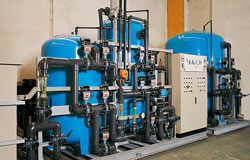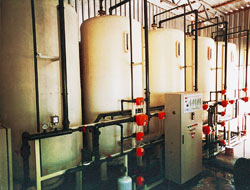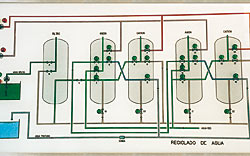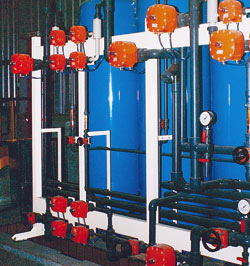Ion exchange resins

Installation for treatment of 25 cu. m per hour.
Traditionally, the methods used to achieve greater inflow water quality in industrial processes, have involved treating it using "ION EXCHANGE RESINS". These methods are based on the chemical interaction of the resins, especially designed for the different functions, with the saline or organic components in the water. Design of these plants is based on the nature of the water to be treated, the quality required and the flow rates.
This technique is commonly used in:

The plants are operated from a panel which controls all the elements and processes
Treatment of Inflow water in:
- Power production plants, co-generation plants, biogas
- Chemical industry
- Petrochemical industry
- Paper Industry
- Brewing Industry
Using different processes:
Softening, decarbonation, dealkalization, deacidification, desilification, deoxidation and adsorption of organic substances..
Environment:
- Deionised water in surface treatment processes
- Removal of remains of heavy metals
- Recovery of valuable metals
- Removal of organic impurities
- Treatment of contaminated wells and land

A synoptic diagram shows plant operation at all times
Food processes:
- Colour removal
- Deionization
- Separation of sugars
Nuclear industry:
- Supply and cooling water
- Waste treatment
- Recovery of valuable metals

All circuits in the unit have electric valves controlled by the PLC. These perform the maintenance operations
Semiconductor industry:
- Ultrapure water
